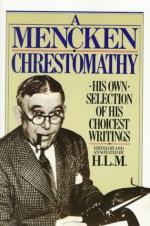
|
| Name: _________________________ | Period: ___________________ |
This test consists of 5 multiple choice questions, 5 short answer questions, and 10 short essay questions.
Multiple Choice Questions
1. What is Mencken's opinion of original Christians?
(a) They were vulgar cads without imagination.
(b) The historical record is so poor that Mencken cannot form an opinion.
(c) They were patriots, akin to the Founding Fathers.
(d) They were "men's men" and should be looked upon as examples.
2. How does Mencken describe Oliver Wendell Holmes?
(a) He was a tool of liberal elites.
(b) He was a tool of conservative fuddy-duddies.
(c) He was a completely inept United States Senator.
(d) He was a brilliant reasoner.
3. What was the most damning effect of the Civil War, in regard to the South?
(a) It created the Southern aristocracy.
(b) It introduced technology into an innocent and primitive society.
(c) It replaced religious values with secular ones.
(d) It destroyed the Southern aristocracy.
4. Before democracy came to be, what did people believe this system of government to be?
(a) They believed democracy was just another form of dictatorship.
(b) A wretched form of government that should not come to pass.
(c) It was such a foreign concept, no one could really imagine it.
(d) A heavenly form of government.
5. What is Mencken's opinion about the variety of political systems?
(a) Different political systems accomplish vastly different things.
(b) Dictatorship is preferable to oligarchy.
(c) Aristocracy is by far the worst form of government.
(d) All governments accomplish the same thing and there are very little differences.
Short Answer Questions
1. What is the relationship between free will and morality?
2. At what event did Mencken first personally encounter William Jennings Bryan?
3. How did morality come to be, according to Mencken?
4. Punishment for crime is too often what, according to Mencken?
5. Which is NOT one of the reasons Mencken praises George Washington?
Short Essay Questions
1. Who is Professor Thorstein Veblen, and what is Mencken's opinion of him and his work?
2. Describe Mencken's conception of the Anglo-Saxon American. What are this person's flaws?
3. What is the origin of morality according to Mencken?
4. Describe Mencken's contention that democracy is a "self-limiting disease." What does he mean by that? Is there any good aspects to democracy?
5. What is the average person's opinion of government, according to Mencken?
6. What effect did the Civil War have on the American South, and why was this conflict so disastrous to Mencken from a cultural standpoint?
7. Is morality necessary in Mencken's view? How many people are moral people? Is there a good and evil, or is that a human-created concept?
8. What is Mencken's take on the universality of morality? Can morality grow and change, or is it static?
9. Name four historic events Mencken mentions in Chapter 12, and his opinion of them.
10. What is Mencken's view of romantic love?
|
This section contains 1,076 words (approx. 4 pages at 300 words per page) |

|




